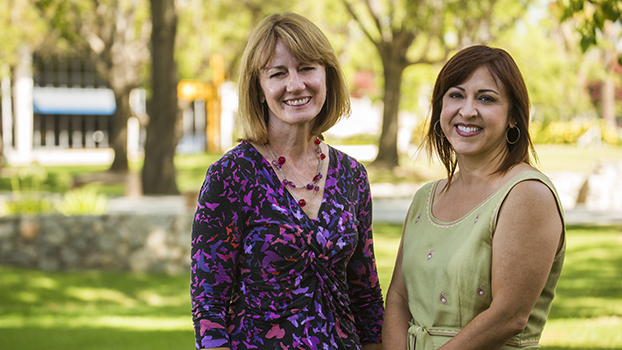 Caption: Sue Fisher and Pat Balderas. Photo: Matt Gush Download Photo
Caption: Sue Fisher and Pat Balderas. Photo: Matt Gush Download Photo
Staff Representation
Fisher and Balderas Reflect on Serving on Academic Senate
Last fall, faculty and administrators who make up the Academic Senate voted unanimously to include two staff members among their ranks.
With a special election a month later, Sue Fisher, emergency management coordinator in University Police, and Pat Balderas, business manager for the College of Humanities and Social Sciences, were seated as the first staff senators since the late 1980s.
“The only major, full-time Fullerton constituency not represented on the Academic Senate was the full-time staff,” said Jack Bedell, chair of the senate and emeritus professor of sociology. “It seemed logical for a group that prides itself on inclusion to include these very valuable employees and contributors to the university’s success. We are most fortunate to have Sue and Pat as Academic Senate colleagues.”
During their tenure, they have joined in discussions and voted on proposed changes to such policies dealing with smoking on campus, repetition of courses and international education. Their positions were affirmed in May when they were elected to full one-year terms.
“I think the appointment of staff members to the Academic Senate was a wonderful idea,” said Fisher, a CSUF alumna (M.S. environmental studies ’03) who became a staff member in 1991.
Fellow alumna Balderas (B.A. business administration – accounting ’85), a staff member since 2001, agrees. “Lately it seems that the issues facing the senate are not just related to academics and because of that, I think it is important to have staff representation on the Academic Senate.
“I considered running for senate as a way to get involved on campus outside my regular job,” said Balderas, adding that with her financial background and knowledge of the college, departments and programs, “I bring to the senate an aspect of the day-to-day campus operations, I know how the campus operates, how to navigate it and how to get things done.”
“Although I do teach an occasional class in health science, my perspective is really as a staff member,” said Fisher. “I have had many student assistants work for me over the years and considered many of them my friends, so I have been able to hear their experiences from a slightly different perspective than that of a faculty member. I also interact a lot with staff members from all over the campus, so I hope that I can bring those voices into the academic arena and hopefully enhance or change the way we think about certain things.”
Both women believe in the idea of an Academic Senate to meet and discuss issues important to the campus community.
“Faculty need to have discussions concerning university affairs at a level that is thorough and allows voices from all departments to be heard,” said Fisher. “Faculty members are the cornerstone of our education process and their work reinforces that.
“From outside (the senate), you will hear, ‘Oh, don’t take that discussion to the Academic Senate, it will get politicized, complicated’,” Fisher added. “After one sits through a few meetings, you realize that they are still all people with the same goal: to make teaching and research the best possible and produce a high-quality graduate.”
“Someone once asked me why I wanted to be on senate, that all they do is argue,” said Balderas. “But I have I have found the discussions to be interesting and relevant, and am glad I can contribute and voice my perspective on them.”
Fisher said that when she joined, she was not surprised at how business was conducted in the meetings. “It is a group of people, who often have divergent views, working together for a common cause. I was surprised, however, at how often they were able to laugh and poke fun at one another, but I think some of that comes from the leadership — current Chair Jack Bedell. He manages to lend an air of respect yet with a good dose of fun at every meeting. It helps us remember our humanity.”
Balderas believes it is Bedell’s leadership that has helped move many of this year’s tough issues and policies through the senate without acrimony. During these tight budget times, said Balderas, more discussions about changes and cuts to the campus are going to be necessary and they are going to call for a forum so all sides can be heard.
“I would like to see more discussion of education as a holistic product,” said Fisher. “Of course, my role on campus is to prepare us for emergencies, but I really believe that there should be an integrated piece of some type of preparedness in every curriculum. There should be procedures on how to stop an exam when a fire alarm sounds, there should be plans for recovering from something disastrous, such as a major earthquake.
“While these are not specific things that have to do directly with teaching students, they play a large role in ensuring that something is in place to continue an exam, a procedure or any other operation when something comes along to completely disturb it," continued Fisher.
And because there are now staff members on the senate, Balderas believes that discussions about alternative work schedules might be an area of future discussion.
“Technology now allows us to work from home or away from the office, which can help ease parking and increase productivity,” she said. “Or alternating staff hours to work later into the evenings could make services available to students who can’t make it to campus between 8 a.m. and 5 p.m.”
July 20, 2012
